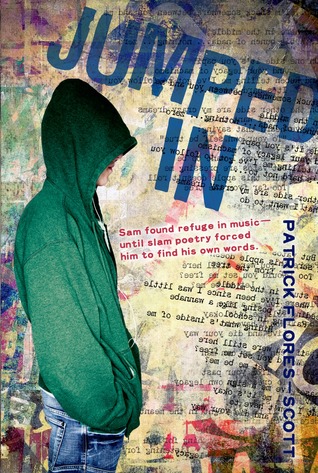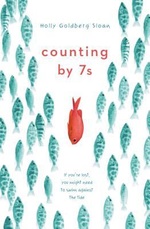 This was a banner year for chapter books, making it difficult to choose some favorites for this year. Members of the International Reading Association's Children’s Literature and Reading Special Interest Group offer some titles that will want to include while you are catching up on your year’s reading.
This was a banner year for chapter books, making it difficult to choose some favorites for this year. Members of the International Reading Association's Children’s Literature and Reading Special Interest Group offer some titles that will want to include while you are catching up on your year’s reading.
Berry, Julie. (2013). All the truth that’s in me. New York: Viking Juvenile.
 The citizens of Roswell Station are a judgmental lot and deal severely with those who break the town's rules or seem to be different from the norm. When she is fourteen, Judith and her best friend Lottie disappear from town. Lottie's body floats down the river while Judith doesn't return for two years. Judith's cut tongue makes it hard for her to communicate, and because her mother fears what others will say, she insists that Judith remain mute, rarely speaking. Only when the village is threatened by outsiders does she return to her kidnapper to enlist his help. Thanks to an unexpected friend, she begins trying to speak and even decides to attend school. Ever since she was a child, Judith has loved Lucas, a handsome local boy. But he seems to pay her little mind, and after she returns from her kidnapping, he barely notices her. The author describes her loneliness and hidden passion vividly while also making it clear that many of the villagers are not as pure as they might seem. The schoolmaster, for instance, is revealed in all his lechery and determination to force Judith to submit to his unwanted physical attentions. Judith's mother pays her little attention, even shutting the door against her when she most needs her help. Were it not for the horse and cow in the barn, her brother, and Maria who encourages her to speak, her lot would be, indeed, loveless. I liked the female friendship she develops with Maria and the fact that Goody Pruett turns out to be more than a busybody or judgmental elderly woman. Her desire for Lucas is palpable especially since the entire book is addressed to him through the author's use of second person. This title, evoking the Puritan ethic effectively, brings to mind The Scarlet Letter and Speak, reminding teen readers of the power found in finding and using one's voice, especially in righting a wrong. Readers will be impressed with Judith’s stamina and determination to have more than has been allotted to her and hope that she would find some semblance of happiness by the end of the book. The story is powerfully told and keeps readers’ attention.
The citizens of Roswell Station are a judgmental lot and deal severely with those who break the town's rules or seem to be different from the norm. When she is fourteen, Judith and her best friend Lottie disappear from town. Lottie's body floats down the river while Judith doesn't return for two years. Judith's cut tongue makes it hard for her to communicate, and because her mother fears what others will say, she insists that Judith remain mute, rarely speaking. Only when the village is threatened by outsiders does she return to her kidnapper to enlist his help. Thanks to an unexpected friend, she begins trying to speak and even decides to attend school. Ever since she was a child, Judith has loved Lucas, a handsome local boy. But he seems to pay her little mind, and after she returns from her kidnapping, he barely notices her. The author describes her loneliness and hidden passion vividly while also making it clear that many of the villagers are not as pure as they might seem. The schoolmaster, for instance, is revealed in all his lechery and determination to force Judith to submit to his unwanted physical attentions. Judith's mother pays her little attention, even shutting the door against her when she most needs her help. Were it not for the horse and cow in the barn, her brother, and Maria who encourages her to speak, her lot would be, indeed, loveless. I liked the female friendship she develops with Maria and the fact that Goody Pruett turns out to be more than a busybody or judgmental elderly woman. Her desire for Lucas is palpable especially since the entire book is addressed to him through the author's use of second person. This title, evoking the Puritan ethic effectively, brings to mind The Scarlet Letter and Speak, reminding teen readers of the power found in finding and using one's voice, especially in righting a wrong. Readers will be impressed with Judith’s stamina and determination to have more than has been allotted to her and hope that she would find some semblance of happiness by the end of the book. The story is powerfully told and keeps readers’ attention.
- Barbara A. Ward, Washington State University Pullman
Deuker, Carl. (2013). Swagger. New York: Houghton Mifflin Harcourt.
 Fans of Carl Deuker will certainly enjoy his latest offering, Swagger, filled as it is with an imperfect but likeable protagonist and ethical dilemmas that could have been torn from today's newspaper headlines. One of the aspects of this author's writing that has always impressed me is how he approaches topics that other sports writers tend to avoid. He does so gently but relentlessly so that readers are swept up by the characters' lives and the decisions that face them. Because he includes plenty of descriptions of the sports activity—in this case, basketball—reluctant readers are a lot less reluctant to read a book. This title focuses on Jonas Dolan, a starting point guard for his California team. When his coach encourages him to apply for an athletic scholarship with a Division II team, he makes efforts to improve his work in the classroom and on the court. But his family's relocation to Seattle means that he has to start over and win a place on his new high school team. The new coach already has a starting point guard, and his style of playing doesn't suit Jonas's, which is more suited to new assistant coach Ryan Hartwell's. Jonas befriends kind-hearted Levi Rawdon, a tall, quiet boy whose father is a minister. As the basketball season moves on with Ryan getting limited playing time at the start and more as the team comes together, he must deal with a secret revealed to him by Levi. Readers will find the quagmire in which Jonas is mired to be quite realistic as well as being fascinated by the web woven by his coach. Even though there are some elements of the book that strain credibility, I still enjoyed this title, as will many teen readers. Many of them may want to follow Jonas's decision to do the right thing, even despite what it costs him. In the end it seems pretty clear that no one needs to swagger to show his or her confidence.
Fans of Carl Deuker will certainly enjoy his latest offering, Swagger, filled as it is with an imperfect but likeable protagonist and ethical dilemmas that could have been torn from today's newspaper headlines. One of the aspects of this author's writing that has always impressed me is how he approaches topics that other sports writers tend to avoid. He does so gently but relentlessly so that readers are swept up by the characters' lives and the decisions that face them. Because he includes plenty of descriptions of the sports activity—in this case, basketball—reluctant readers are a lot less reluctant to read a book. This title focuses on Jonas Dolan, a starting point guard for his California team. When his coach encourages him to apply for an athletic scholarship with a Division II team, he makes efforts to improve his work in the classroom and on the court. But his family's relocation to Seattle means that he has to start over and win a place on his new high school team. The new coach already has a starting point guard, and his style of playing doesn't suit Jonas's, which is more suited to new assistant coach Ryan Hartwell's. Jonas befriends kind-hearted Levi Rawdon, a tall, quiet boy whose father is a minister. As the basketball season moves on with Ryan getting limited playing time at the start and more as the team comes together, he must deal with a secret revealed to him by Levi. Readers will find the quagmire in which Jonas is mired to be quite realistic as well as being fascinated by the web woven by his coach. Even though there are some elements of the book that strain credibility, I still enjoyed this title, as will many teen readers. Many of them may want to follow Jonas's decision to do the right thing, even despite what it costs him. In the end it seems pretty clear that no one needs to swagger to show his or her confidence.
- Barbara A. Ward, Washington State University Pullman
Farrant, Natasha. (2013). After Iris. New York: Dial.
 Twelve-year-old Bluebell Gadsby's family seems to be tearing apart. Her twin sister Iris died three years ago, and no one seems to want to talk about Iris anymore. While her mother and father go their separate ways with jobs that necessitate much travel, Blue and her siblings are left under the care of Zoran, a patient au pair who seems more concerned with the children than their parents. Blue uses her video camera and diary entries to capture her complicated family, including dramatic older sister Flora, and younger siblings, Jasmine and Twig, who adore rats. Readers' hearts will break for Blue as she experiences her first crush and first betrayal, but they will also applaud how she goes from invisible to all-too noticed when she and a new guy devise a perfect comeuppance for Dodi, Blue's former best friend who has turned on her and has made school somewhat hellish. There are plenty of surprises here as well as an acknowledgement that there are spaces for those among us with their own views of the world around them. There is only so much weirdness and rule-breaking that can be tolerated before something very bad happens. If there is one thing especially worth noting about this book, though, it is the author's delicate handling of mourning and how each of us deal with loss. As is the case of Iris, it often is true that those that leave this world never really leave us, living on in the memories we hold dear.
Twelve-year-old Bluebell Gadsby's family seems to be tearing apart. Her twin sister Iris died three years ago, and no one seems to want to talk about Iris anymore. While her mother and father go their separate ways with jobs that necessitate much travel, Blue and her siblings are left under the care of Zoran, a patient au pair who seems more concerned with the children than their parents. Blue uses her video camera and diary entries to capture her complicated family, including dramatic older sister Flora, and younger siblings, Jasmine and Twig, who adore rats. Readers' hearts will break for Blue as she experiences her first crush and first betrayal, but they will also applaud how she goes from invisible to all-too noticed when she and a new guy devise a perfect comeuppance for Dodi, Blue's former best friend who has turned on her and has made school somewhat hellish. There are plenty of surprises here as well as an acknowledgement that there are spaces for those among us with their own views of the world around them. There is only so much weirdness and rule-breaking that can be tolerated before something very bad happens. If there is one thing especially worth noting about this book, though, it is the author's delicate handling of mourning and how each of us deal with loss. As is the case of Iris, it often is true that those that leave this world never really leave us, living on in the memories we hold dear.
- Barbara A. Ward, Washington State University Pullman
Flores-Scott, Patrick. (2013). Jumped in. New York: Henry Holt and Company.
 Sophomore Sam Gregory has learned how to blend into the scenery in his Des Moines, Washington high school. He follows certain rules that make sure he won't be noticed by his teachers or classmates and spends most of his afternoons sleeping in his grandparents' home. Sam longs for the good old days when he and his mother lived in Aberdeen and he and his buddies listened to the music of Nirvana and dreamed of starting their own band. When he and Luis Cardenas are seated together in English class, at first he fears the boy that he is sure is a gangster, but he eventually realizes that the two of them have something in common. As they work together on a piece for the class poetry slam dreamed up by their teacher, Ms. Cassidy, both confront their fears. Readers will be moved by this story and impressed by the poetry of Luis that is inserted between the chapters. When the truth about Luis and the scar on his neck is revealed, tissues will be needed. Sam is able to move past his own anxieties and open himself to including others in his life despite the fact that his mother seemingly has abandoned him and he fears being hurt when someone gets too close. The addition of names to his cell phone address book provides ready evidence that he matters to others just as they matter to him. Readers will want to read this while listening to Nirvana's musical accompaniment. While the friendship between the boys develops a bit too quickly to be believable and Sam's initial depression goes unnoticed by school authorities and his grandparents for far too long, the book still presents an authentic struggle by two teens trying to fly beneath the radar while also having quite a lot to say. Even Gilbert, his grandparents' parrot, constantly reminds him of his mother's departure, making it hard for him to move past her betrayal. As the book comes to a close, readers will still be curious about Sam and Luis, and will keep thinking about how Luis had been jumped in, not into a street gang, but into the world of poets and those who express their thoughts most effectively through poetry.
Sophomore Sam Gregory has learned how to blend into the scenery in his Des Moines, Washington high school. He follows certain rules that make sure he won't be noticed by his teachers or classmates and spends most of his afternoons sleeping in his grandparents' home. Sam longs for the good old days when he and his mother lived in Aberdeen and he and his buddies listened to the music of Nirvana and dreamed of starting their own band. When he and Luis Cardenas are seated together in English class, at first he fears the boy that he is sure is a gangster, but he eventually realizes that the two of them have something in common. As they work together on a piece for the class poetry slam dreamed up by their teacher, Ms. Cassidy, both confront their fears. Readers will be moved by this story and impressed by the poetry of Luis that is inserted between the chapters. When the truth about Luis and the scar on his neck is revealed, tissues will be needed. Sam is able to move past his own anxieties and open himself to including others in his life despite the fact that his mother seemingly has abandoned him and he fears being hurt when someone gets too close. The addition of names to his cell phone address book provides ready evidence that he matters to others just as they matter to him. Readers will want to read this while listening to Nirvana's musical accompaniment. While the friendship between the boys develops a bit too quickly to be believable and Sam's initial depression goes unnoticed by school authorities and his grandparents for far too long, the book still presents an authentic struggle by two teens trying to fly beneath the radar while also having quite a lot to say. Even Gilbert, his grandparents' parrot, constantly reminds him of his mother's departure, making it hard for him to move past her betrayal. As the book comes to a close, readers will still be curious about Sam and Luis, and will keep thinking about how Luis had been jumped in, not into a street gang, but into the world of poets and those who express their thoughts most effectively through poetry.
- Barbara Ward, Washington State University Pullman
Knowles, Jo. (2013). Living with Jackie Chan. Somerville, MA: Candlewick Press.
 As does the equally elegantly written title, The First Part Last by Angela Johnson, this book looks at the after-effects of a pregnancy from the point of view of the male. Josh is essentially a good person who made a bad decision. After a casual one-night stand with Ellie results in an unwanted pregnancy, he is haunted by what happened to their child. Josh moves in with his uncle Larry who idolizes Jackie Chan and teaches karate to him. Naturally, he isn't merely teaching him karate but a way to live life and treat others, something Josh recognizes even while hiding his own pain from everyone around him. The more Josh tries to forget his actions, the more they haunt him, leaving him unable to hear a baby crying without second-guessing himself. As Larry, his cat Clover, and Stella, an attractive teen in his karate class, try to help him find his way back to himself while forgiving himself for his mistakes, Josh flounders through his final year of high school, keeping his distance and observing the changes in his own parents who have inextricably found a way to hold onto their own relationship against all the odds. Fans of this book's predecessor, Jumping off Swings, will be delighted to find out what happens to Josh. The author raises plenty of tough questions while setting her characters in challenging situations from which they must rise or fall. The outcome for some might be predictable but not for all of the characters. For instance, Stella's loss of herself and need to be available to her boyfriend Britt and his whims mirrors her mother's compliance to her own boyfriend's needs, something she is unable to see throughout most of the book. The author did not simply give in to the easy path and start a late-blooming romance between Josh and Stella. The possibility is there, but so is the possibility that they will become even better friends, an outcome that seems all too rare in much of today's literature for teens. This thoughtful, provocative book is sure to prompt much introspection and examination.
As does the equally elegantly written title, The First Part Last by Angela Johnson, this book looks at the after-effects of a pregnancy from the point of view of the male. Josh is essentially a good person who made a bad decision. After a casual one-night stand with Ellie results in an unwanted pregnancy, he is haunted by what happened to their child. Josh moves in with his uncle Larry who idolizes Jackie Chan and teaches karate to him. Naturally, he isn't merely teaching him karate but a way to live life and treat others, something Josh recognizes even while hiding his own pain from everyone around him. The more Josh tries to forget his actions, the more they haunt him, leaving him unable to hear a baby crying without second-guessing himself. As Larry, his cat Clover, and Stella, an attractive teen in his karate class, try to help him find his way back to himself while forgiving himself for his mistakes, Josh flounders through his final year of high school, keeping his distance and observing the changes in his own parents who have inextricably found a way to hold onto their own relationship against all the odds. Fans of this book's predecessor, Jumping off Swings, will be delighted to find out what happens to Josh. The author raises plenty of tough questions while setting her characters in challenging situations from which they must rise or fall. The outcome for some might be predictable but not for all of the characters. For instance, Stella's loss of herself and need to be available to her boyfriend Britt and his whims mirrors her mother's compliance to her own boyfriend's needs, something she is unable to see throughout most of the book. The author did not simply give in to the easy path and start a late-blooming romance between Josh and Stella. The possibility is there, but so is the possibility that they will become even better friends, an outcome that seems all too rare in much of today's literature for teens. This thoughtful, provocative book is sure to prompt much introspection and examination.
- Barbara A. Ward, Washington State University Pullman
Koertge, Ron. (2013). Coaltown Jesus. Somerville, MA: Candlewick Press.
 Walker and his mother continue to mourn the loss of seventeen-year-old Noah, Walker's older brother. Jesus makes several appearances to help Walker come to terms with Noah's death and his own guilt about something he said to his brother. Since the story is told in a novel in verse format, it is quite accessible to teen readers even while raising questions about divinity, faith, and death. The Jesus who is depicted here is a very human one, witty, honest, irreverent, and interested in some of the world's more modern conveniences. As with all of this author's books, this one raises as many questions as it answers, even while offering some hope to the bereaved.
Walker and his mother continue to mourn the loss of seventeen-year-old Noah, Walker's older brother. Jesus makes several appearances to help Walker come to terms with Noah's death and his own guilt about something he said to his brother. Since the story is told in a novel in verse format, it is quite accessible to teen readers even while raising questions about divinity, faith, and death. The Jesus who is depicted here is a very human one, witty, honest, irreverent, and interested in some of the world's more modern conveniences. As with all of this author's books, this one raises as many questions as it answers, even while offering some hope to the bereaved.
- Barbara A. Ward, Washington State University Pullman
Kowitt, H. N. (2013). The loser list: Take me to your loser. New York: Scholastic.
 Everybody's favorite loser, Danny Shine, concocts a plan to get involved in the school student government in order to avoid having to wrestle Bruiser Pekarsky. As happens with just about everything associated with Danny, things don't go the way he expects, and he ends up becoming more involved with student government than he ever planned. In fact, he is elected president in a bizarre of turn of events, and must lead the class in choosing how to spend a financial gift from donors. The student council members find it impossible to agree on almost anything, and Danny is subject to much pressure from his classmates and friends, all of whom have worthy projects on which the money could be spent. How can he choose from among the worthy causes, including an origami crane folding project, paintball warriors, a musical, and his friends' monster truck zombie film? Readers will laugh as they turn every page.
Everybody's favorite loser, Danny Shine, concocts a plan to get involved in the school student government in order to avoid having to wrestle Bruiser Pekarsky. As happens with just about everything associated with Danny, things don't go the way he expects, and he ends up becoming more involved with student government than he ever planned. In fact, he is elected president in a bizarre of turn of events, and must lead the class in choosing how to spend a financial gift from donors. The student council members find it impossible to agree on almost anything, and Danny is subject to much pressure from his classmates and friends, all of whom have worthy projects on which the money could be spent. How can he choose from among the worthy causes, including an origami crane folding project, paintball warriors, a musical, and his friends' monster truck zombie film? Readers will laugh as they turn every page.
- Barbara A. Ward, Washington State University Pullman
Larson, Kirby. (2013). Duke. New York: Scholastic.
 Eleven-year-old Hobie Hansen loves his German shepherd, Duke, and having his companionship in his Seattle home eases the pain of having his father so far away during WWII. When he learns about Dogs for Defense, he feels compelled to loan Duke to the military, an action that is further motivated by pressure and bullying from Mitch, one of his classmates. But he immediately has second thoughts about his decision, especially when he realizes that many of the dogs in the K-9 units will be used in the war effort and not simply remain stateside as guards. The author captures Hobie's naïve belief that Duke will make it home safely and that he can somehow persuade the Marine with whom he's been paired to send him back to his owner. His letters to Marv, and Marv's letters back to him are brief but poignant. So desperate is Hobie to be reunited with Duke that he is ready to volunteer a friend's dog for military service so that he can have Duke back again. The inclusion of details such as radio programs, foods, slogans, shoe brands, the blue and gold stars in family windows, and recipes lend authenticity to a story that is clearly well-researched and written from the heart. Pair this one with Cracker by Cynthia Kadohata about a war dog during Vietnam or the recently released Dogs of War. Readers should be warned, though, that this book will tug at their heart strings and make them appreciate their own canine companions even more than they did before. This is another moving tale told with dignity by the always-reliable Kirby Larson.
Eleven-year-old Hobie Hansen loves his German shepherd, Duke, and having his companionship in his Seattle home eases the pain of having his father so far away during WWII. When he learns about Dogs for Defense, he feels compelled to loan Duke to the military, an action that is further motivated by pressure and bullying from Mitch, one of his classmates. But he immediately has second thoughts about his decision, especially when he realizes that many of the dogs in the K-9 units will be used in the war effort and not simply remain stateside as guards. The author captures Hobie's naïve belief that Duke will make it home safely and that he can somehow persuade the Marine with whom he's been paired to send him back to his owner. His letters to Marv, and Marv's letters back to him are brief but poignant. So desperate is Hobie to be reunited with Duke that he is ready to volunteer a friend's dog for military service so that he can have Duke back again. The inclusion of details such as radio programs, foods, slogans, shoe brands, the blue and gold stars in family windows, and recipes lend authenticity to a story that is clearly well-researched and written from the heart. Pair this one with Cracker by Cynthia Kadohata about a war dog during Vietnam or the recently released Dogs of War. Readers should be warned, though, that this book will tug at their heart strings and make them appreciate their own canine companions even more than they did before. This is another moving tale told with dignity by the always-reliable Kirby Larson.
- Barbara A. Ward, Washington State University Pullman
Sloan, Holly Goldberg. (2013). Counting by 7s. New York: Dial.
 While this book isn't perfect, reading it made me smile and laugh and reminded me to be a better person. Twelve-year-old Willow Chance is at the book's heart. Willow was adopted by her parents who could tell that she saw the world differently than others did, and subsequently nurtured that uniqueness. Her interests aren't the typical hobbies of middle schoolers since she is fascinated by human medical conditions and gardening on a large scale. As she heads into middle school, she hopes it will offer some challenges, but that notion is quickly dispelled. Accused of cheating on a standardized test, Willow is sent to counseling with the decidedly incompetent Dell Duke, who becomes fascinated with her genius status. She meets Nguyen Thi Mai and Nguyen Quang-ha at the counseling office and is quickly impressed with Mai. When her parents are killed in a wreck, Willow has nowhere to go, but her new friend comes up with a plan that solves everything temporarily. I enjoyed how the author allowed Willow to slowly take interest in the world around her again even while continuing to mourn her parents, and how she somehow found a family, even though that family didn't fit the expectations of social services. Willow's innate goodness shines thorough in so many ways, and it would be impossible not to root for her to have a happy ending. As they read this title, readers may find themselves thinking of the irrepressibly optimistic nature of Amber Appleton in Matthew Quick's Sorta Like a Rock Star. Somehow, Willow makes those around her better just by knowing her. There are so many philosophical moments contained in this book as well as reminders about how everything seems to connect and that our actions always have consequences. Even Dell comes to realize this once he sees what has happened to Cheddar, the cat he brought to work one day. Like the seeds Willow plants, this book plants seeds of hope that each of us can make this world a better place, starting with ourselves. This one will stick with readers and make them continue to think long after the book has been closed.
While this book isn't perfect, reading it made me smile and laugh and reminded me to be a better person. Twelve-year-old Willow Chance is at the book's heart. Willow was adopted by her parents who could tell that she saw the world differently than others did, and subsequently nurtured that uniqueness. Her interests aren't the typical hobbies of middle schoolers since she is fascinated by human medical conditions and gardening on a large scale. As she heads into middle school, she hopes it will offer some challenges, but that notion is quickly dispelled. Accused of cheating on a standardized test, Willow is sent to counseling with the decidedly incompetent Dell Duke, who becomes fascinated with her genius status. She meets Nguyen Thi Mai and Nguyen Quang-ha at the counseling office and is quickly impressed with Mai. When her parents are killed in a wreck, Willow has nowhere to go, but her new friend comes up with a plan that solves everything temporarily. I enjoyed how the author allowed Willow to slowly take interest in the world around her again even while continuing to mourn her parents, and how she somehow found a family, even though that family didn't fit the expectations of social services. Willow's innate goodness shines thorough in so many ways, and it would be impossible not to root for her to have a happy ending. As they read this title, readers may find themselves thinking of the irrepressibly optimistic nature of Amber Appleton in Matthew Quick's Sorta Like a Rock Star. Somehow, Willow makes those around her better just by knowing her. There are so many philosophical moments contained in this book as well as reminders about how everything seems to connect and that our actions always have consequences. Even Dell comes to realize this once he sees what has happened to Cheddar, the cat he brought to work one day. Like the seeds Willow plants, this book plants seeds of hope that each of us can make this world a better place, starting with ourselves. This one will stick with readers and make them continue to think long after the book has been closed.
- Barbara A. Ward, Washington State University Pullman
Vanderpool, Claire. (2013). Navigating Early. New York: Delacorte Books for Children.
 Thirteen-year-old Jack Baker is still processing his mother's unexpected death when his father, a military officer, moves him from their Kansas home to a Maine boarding school near his base. Jack tries to cover up his ignorance about boats and the water, but his classmates quickly realize that he knows little about those things. As he wanders through the school, looking for a way to fit in, he becomes increasingly drawn to the mysterious and eccentric Early Auden. Early plays records, certain singers and songs for each day, and Billie Holiday for rainy days. Left alone in the school during a holiday, they head to the Appalachian Trail on a quest. A mathematical savant, Early is convinced that the numbers in pi tell a story, and that the experiences of the main character in that particular story mirror those of his own brother, Fisher, who was killed during WWII. As the boys make their way via boat and on foot through the woods, they encounter all sorts of strange creatures, both human and animal, including pirates, a black bear, and lost souls filled with regret over words never spoken or seeking closure. Readers' hearts will surely break, as did mine, at some of the encounters, while pounding in excitement at the ways the individual stories all seem to somehow intersect. There are moments that seem tinged with magic, and others that will leave readers thinking about how all the pieces of the book come together. It's impossible not to fall in love with Jack and Early for very different reasons, especially Early's penchant for providing synonyms for the words he uses. For example, this passage is typical of Early: "Maybe we could ask them to give the Maine back. Now that Captain MacScott is 'no longer with us,'" he said, using finger quotation marks. "That means someone's dead. Or you can say kicked the bucket or bought the farm or cashed in his chips or gave up the ghost--" (p. 277). For someone so clueless about certain social skills, Early possesses abundant reservoirs of awareness about others. This tender, touching story of the journey two boys take will move readers even while they marvel at the deftness of the author's handling of several complex themes and issues.
Thirteen-year-old Jack Baker is still processing his mother's unexpected death when his father, a military officer, moves him from their Kansas home to a Maine boarding school near his base. Jack tries to cover up his ignorance about boats and the water, but his classmates quickly realize that he knows little about those things. As he wanders through the school, looking for a way to fit in, he becomes increasingly drawn to the mysterious and eccentric Early Auden. Early plays records, certain singers and songs for each day, and Billie Holiday for rainy days. Left alone in the school during a holiday, they head to the Appalachian Trail on a quest. A mathematical savant, Early is convinced that the numbers in pi tell a story, and that the experiences of the main character in that particular story mirror those of his own brother, Fisher, who was killed during WWII. As the boys make their way via boat and on foot through the woods, they encounter all sorts of strange creatures, both human and animal, including pirates, a black bear, and lost souls filled with regret over words never spoken or seeking closure. Readers' hearts will surely break, as did mine, at some of the encounters, while pounding in excitement at the ways the individual stories all seem to somehow intersect. There are moments that seem tinged with magic, and others that will leave readers thinking about how all the pieces of the book come together. It's impossible not to fall in love with Jack and Early for very different reasons, especially Early's penchant for providing synonyms for the words he uses. For example, this passage is typical of Early: "Maybe we could ask them to give the Maine back. Now that Captain MacScott is 'no longer with us,'" he said, using finger quotation marks. "That means someone's dead. Or you can say kicked the bucket or bought the farm or cashed in his chips or gave up the ghost--" (p. 277). For someone so clueless about certain social skills, Early possesses abundant reservoirs of awareness about others. This tender, touching story of the journey two boys take will move readers even while they marvel at the deftness of the author's handling of several complex themes and issues.
- Barbara A. Ward, Washington State University Pullman
These reviews are submitted by members of the International Reading Association's Children's Literature and Reading Special Interest Group (CL/R SIG) and are published weekly on Reading Today Online.